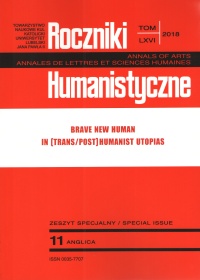The Ultimate Post-humanist Nostalgia in the TV Show Being Human US: Monstrous Home as an Allegory of the Human
Abstract
This article interrogates a tension between post-humanist and humanist modalities of home created by hybrid monsters featured in the TV show Being Human US: a ghost, vampire and a werewolf (pair). The uncanny home emerges as a palimpsest of architectural and allegorical space, while the monstrous cohabitation gives rise to an allegorical model of the human; a model that wistfully gestures at the utopian vision of the future post-humanist world, and is simultaneously pulled back by the nostalgically traditional humanist conception of the person. By living together, the ghost, the vampire, and the werewolf function as an ensemble that dramatizes the humanist notion of what it means to be human. However, the humanity invoked in the TV show is interrogated from the point of view of critical post-humanism, which is based on the notion of the “post-human” that indicates a perspective where the abiding question of what it means to be human is not only addressed and re-articulated, but also critically assessed and transcended towards an as-yet-unrealizable utopia, promoting altogether new, post-speciesist, post-animist, or even post-global (in the sense of cosmic) ways of inhabiting the world. The momentary utopia of the monstrous cohabitation provides evidence that post-humanist utopian model of a human person is feasible; yet, only if “the impurity” of post-human creatures also becomes a part of the definition of the post-humanist human—a human who is a monster.
References
Badmington, Neil. Alien Chic: Posthumanism and the Other Within. London: Routledge, 2004. Print.
Bammer, Angelika. Partial Visions: Feminism and Utopianism in the 1970s. London: Routledge, 1991. Print.
Being Human US. Muse Entertainment Enterprises, 2011–2014. TV.
Belsey, Catherine. Critical Practice. London: Methuen, 1980. Print.
Boym, Svetlana. The Future of Nostalgia. New York: Basic Books, 2001. Print.
Calarco, Matthew. “Boundary Issues: Human-Animal Relationships in Karen Joy Fowler’s We are All Completely besides Ourselves.” Modern Fiction Studies 60.3 (2014): 616–635. Print.
Clarke, Bruce. Posthuman Metamorphosis: Narrative and Systems. New York: Fordham University Press, 2008. Print.
Costantini, Mariaconctta. “Crossing Boundaries: the Revision of the Gothic Paradigms in Heat and Dust.” Empire and the Gothic: The Politics of Genre. Ed. Andrew Smith and William Hughes. 155–171. Print.
Girard, René. Violence and the Sacred. Trans. Patrick Gregory. Baltimore: Johns Hopkins University Press, 1977. Print.
Greene, Richard. “The Badness of Undeath.” Zombies, Vampires and Philosophy. Ed. Richard Greene and K. Silem Mohammad. Chicago: Open Court, 2010. Ebook.
Hanssen, Beatrice. Walter Benjamin’s Other History: Of Stones, Animals, Human Beings, and Angels. Berkeley: University of California Press, 1998. Print.
Herbrechter, Stefan. Posthumanism: A Critical Analysis. London: Bloomsbury, 2013. Print.
Kelley, Theresa M. Reinventing Allegory. Cambridge: Cambridge University Press, 1997. Print.
Latour, Bruno. We Have Never Been Modern. Trans. Catherine Porter. Cambridge: Harvard University Press, 1993. Print.
Leeder, Murray. “Introduction.” Cinematic Ghosts: Haunting and Spectrality from Silent Cinema to the Digital Era. New York: Bloomsbury Academic, 2015. 1–14. Print.
Levitas, Ruth. Utopia As Method: The Imaginary Reconstitution of Society. Basingstoke: Palgrave Macmillan, 2013. Print.
Nelson, Victoria. Gothicka: Vampire Heroes, Human Gods, and the New Supernatural. Cambridge: Harvard University Press, 2012. Print.
Unger, Roberto Mangabeira. The Self Awakened: Pragmatism Unbound. Cambridge: Harvard University Press, 2007. Print.
Wells, H.G. A Modern Utopia. 1905. Auckland: The Floating Press, 2009. Print.
Wind, Jessica. Your Friendly Neighbourhood Zombie: Normalizing Monstrous Bodies Through Zombie Media. MA Thesis. Carleton University, 2016. Online. Web.
Copyright (c) 2018 Roczniki Humanistyczne

This work is licensed under a Creative Commons Attribution-NonCommercial-NoDerivatives 4.0 International License.





